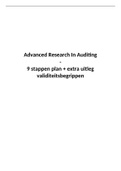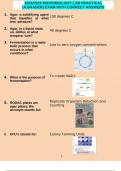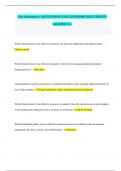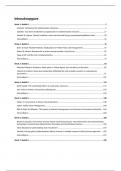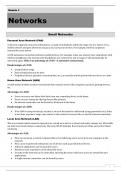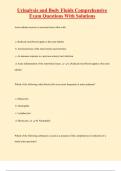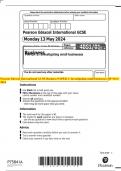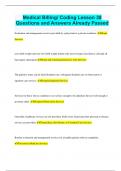BMS72 – CANCER DEVELOPMENT
AND IMMUNE DEFENSE
Opleiding: Master Biomedical Sciences
Onderwijsinstelling: Radboudumc
1
, BMS72 – Cancer Development and Immune Defense
Content
Stem cell biology...............................................................................................................................4
Normal hematopoiesis..........................................................................................................................................4
Development of leukemia.....................................................................................................................................4
Targeted therapy...................................................................................................................................................5
Clonal evolution in myeloid malignancies..........................................................................................5
Mutations and hematopoiesis..............................................................................................................................5
Clonal hematopoiesis of indeterminate potential (ChIP).....................................................................................6
Biomarkers in AML/MDS.......................................................................................................................................6
Clonal evolution in MDS/AML...............................................................................................................................7
Epigenetics........................................................................................................................................7
What is epigenetics?.............................................................................................................................................7
How is gene expression regulated?.......................................................................................................................7
Histone acetylation..........................................................................................................................................7
Histone methylation........................................................................................................................................8
DNA methylation.............................................................................................................................................8
Binding PRC1...................................................................................................................................................8
Epigenetics and cancer..........................................................................................................................................8
Histone methylation – EZH2............................................................................................................................8
DNA methylation – DNMT3a and TET2...........................................................................................................9
Refreshment immunology...............................................................................................................10
NK cells................................................................................................................................................................10
Dendritic cells......................................................................................................................................................10
T cells...................................................................................................................................................................11
Immune therapy..............................................................................................................................12
Allogeneic stem cell transplantation...................................................................................................................12
CAR T cell therapy...............................................................................................................................................13
Modulation of the tumor microenvironment..................................................................................14
The cancer-immunity cycle.................................................................................................................................14
Cancer immunoediting........................................................................................................................................14
The cancer immunogram....................................................................................................................................16
Dendritic cell-based vaccines...........................................................................................................17
2
, BMS72 – Cancer Development and Immune Defense
Production...........................................................................................................................................................17
Quality control.....................................................................................................................................................18
3
, BMS72 – Cancer Development and Immune Defense
Stem cell biology
Normal hematopoiesis
Hematopoietic stem cells (HSCs) are a type of stem cell responsible for forming blood cells. These cells remain
mostly in a “quiescent” or inactive state, dividing only about once every 25 to 50 weeks. This slow division rate
is key to preserving them throughout a person’s life, helping protect them from mutations that could arise from
frequent cell division. Because of this low division frequency, HSCs can function and remain viable over an
individual's entire lifetime.
Cells express unique combinations of molecules on their membrane and in
their cytoplasm (e.g. adhesion molecules, growth factor receptors,
transcription factors, effector molecules in granules, etc). The expression of
these molecules can be studied using fluorochrome-labeled (monoclonal)
antibodies, which can be detected by flow cytometry.
During their maturation, hematopoietic cells express proteins on their cell
membrane (so-called CD markers) and the composition of these proteins
depends on the developmental stage the cell is in. Hematopoietic stem cells
express the surface molecule CD34 on their cell membrane and are CD38 -.
Progenitor cells are CD34+CD38+ and matured blood cells are CD34-CD38+. The combination of the following
markers is typically used to identify HSC populations: CD34+, CD38-, Thy-1+, c-kit+, IL-3R-.
↪ “The” stem cell cannot be identified just by cell surface markers; we can only identify populations.
Development of leukemia
Leukemia is a cancer caused by genetic mutations that disrupt the balance of
cell proliferation, differentiation, and apoptosis. It results in more than 20%
immature cells, or blasts, in the bone marrow. Leukemia types are broadly
categorized as myeloid or lymphoid and as acute (rapid progression) or chronic
(slower progression). Initially, leukemia subtypes were classified based on cell
morphology, but nowadays genetic classification is included.
Leukemia treatment aims for a cure, typically starting with two rounds of
intensive chemotherapy, followed by a third round in some cases, depending
on patient fitness. The only curative treatment for leukemia is
autologous/allogeneic transplantation.
Leukemia develops through the sequential accumulation of mutations resulting in the
formation of leukemia initiating stem cells. These cells differentiate towards progenitor cells that proliferate
growth factor independent and that are blocked in their differentiation (differentiation block). Leukemia is a
multistep process in which more than 1 error must arise in the cell's genetic material. Genes that are mutated
in leukemia can be classified in four major biological groups:
Growth factor receptors
Signal transduction molecules
Gene expression regulation (transcription factors, epigenetic regulators, RNA splicing factors or
chromatin organization)
Apoptosis
↪ For full blown leukemia development usually a combination of mutations in 2-3 genes from different
categories is necessary.
Normal stem cell: generation of all mature blood cell types, life long.
Cancer stem cell: continuous generation of more differentiated immature leukemia blasts.
Leukemia likely originates from an early stem cell. When immature blast cells are transplanted into mice, they
seldom lead to leukemia. In contrast, early leukemia stem cells (LSCs) frequently cause leukemia upon
transplantation, indicating that LSCs are more likely to initiate the disease. However, it does not imply that the
cancer stem cell is directly derived from a normal stem cell, it can also be derived from a more mature cell.
4


